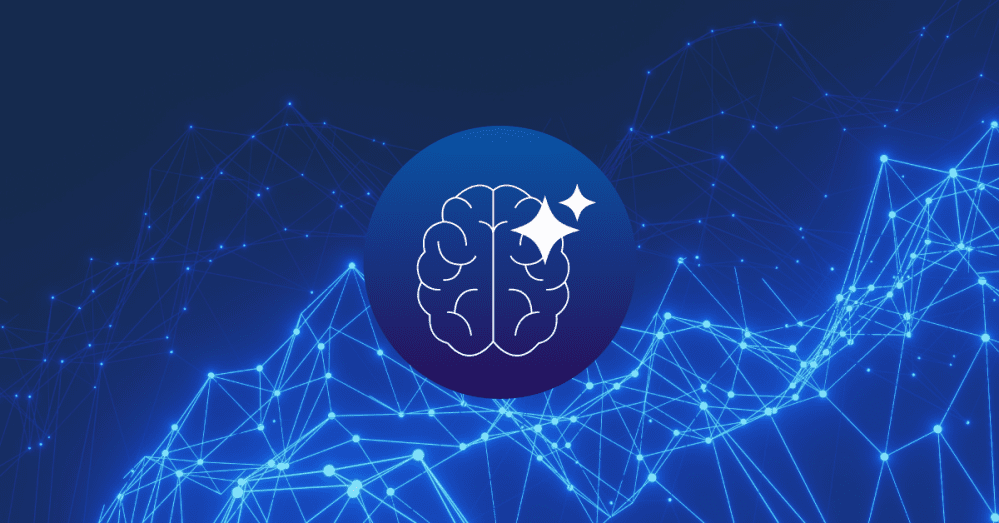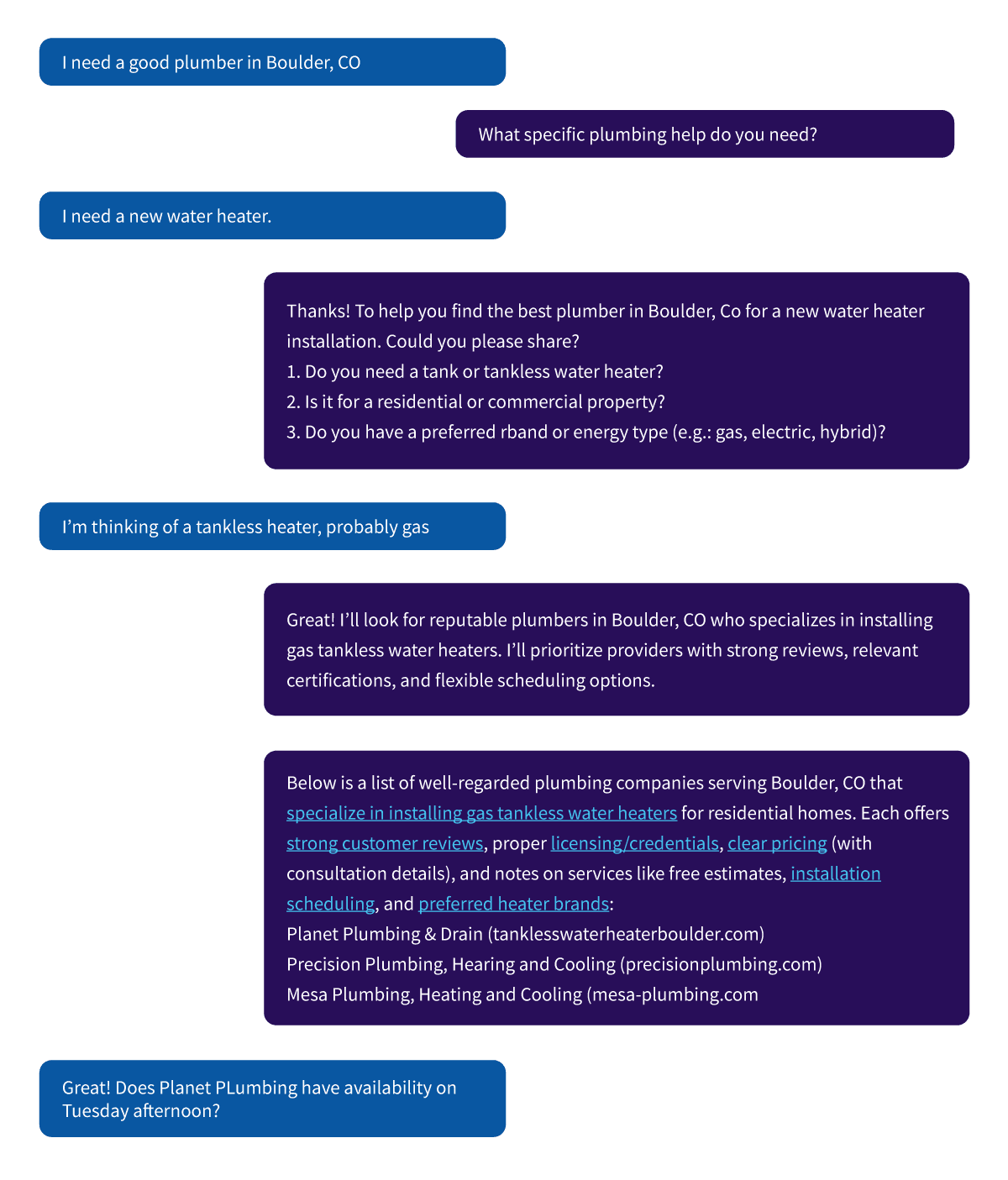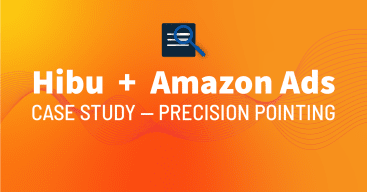If you’ve spent any amount of time online lately, you’re probably well-aware of all the conversations going on about artificial intelligence (AI). And as a small business owner you’re probably paying particular attention to how AI is affecting consumer search habits.
There’s no doubt that AI is changing how people search for information online. Recent findings showed that around 43% of consumers use AI search tools (like ChatGPT or Gemini) daily, and 75% said they use such tools more frequently than a year ago. Google remains the dominant force in the traditional search world, with nearly 90% market share in non-AI consumer searches. If a consumer is looking for a good plumber, lawyer, or dentist, odds are high that their search will start and end on Google’s search engine. But that universe is expanding, with AI-led searches gaining momentum.
What’s evolving now—and at a rapid pace—is the use of AI services like ChatGPT, Claude, Perplexity, Google Gemini, Alexa+, and others for the same type of “local discovery” that has been Google’s bread and butter for years (these are variously called AI Search services, or Answer Engines, across the industry.) Of course, Google is not standing still and is rapidly deploying AI Overviews, AI Mode as well as their Gemini service.
For small business owners, it’s important to understand that this shift isn’t just about fragmentation of audience. That is, it’s not just that consumers (especially younger ones) are now using ChatGPT and these other AI Search services to find local businesses. It’s also that the very nature of this discovery process is changing too.
The good news is that Hibu has already taken some important steps here, with more to come in the near future. Let’s dig deeper into the details.
[Related: What Is AI and How Does It Work?]
The Current State of AI in Search
While generative AI can do things like help you plan daily tasks, create images, and write emails, its most popular use by far is searching for information.
Gen AI offers a fresh approach to finding information online, and people are adopting this new method at a rapid rate. ChatGPT, one of the more popular generative AI tools right now, reached a level of usage in 2 years that it took Google 11 years to achieve. This ever-growing popularity means adaptations for traditional search engines, changes in user behavior, and an impact on SEO as we’ve known it.
AI-powered search engines
With the rise in AI chatbots like ChatGPT, Claude, Jasper, and Perplexity being used for search, more traditional search engines (Google and Bing) are starting to respond. As we mentioned, Google has quickly deployed features like AI Overviews, AI Mode, and their Gemini service. Additionally, Microsoft has integrated their AI-powered Copilot tool into Bing.
By leveraging AI, search engines can deliver more accurate results to user queries. They’re integrating features like predictive search, AI overviews, and query understanding to generate precise outcomes for even the most ambiguous or incomplete searches.
Shifts in user behavior
As technology continues to evolve, it’s causing shifts in the way users search for information online.
Both chatbots (like ChatGPT) and virtual assistants (like Google’s Alexa or Apple’s Siri) have paved the way for more conversational search queries. Where previously Google might receive a query as simple as, “repair my drywall,” now a search will use natural language patterns and sound more like, “I threw my dog’s ball too hard, and it made a hole in my drywall. Should I try to repair it myself or hire someone?” This initial query may then be followed by a back-and-forth conversation between the AI and the consumer that further refines and narrows the final answer.
In fact, a recent study found that only 30% of ChatGPT prompts could be identified as one of these traditional categories:
- Navigational (finding specific sites)
- Informational (learning about topics)
- Commercial (researching products)
- Transactional (making purchases)
The other 70% of prompts consisted of unique queries rarely seen in standard search engines. This strongly suggests that users are finding new ways to gather information and solve their problems.
Additionally, generative AI has led to a new phenomenon known as “zero-click” searches. A “zero-click” search is when a user’s question on a search engine is answered directly on the search engine results page (SERP) without requiring the person to click on a link to visit another website. 58–60% of Google searches now result in zero-clicks. As you can imagine, this has caused a dramatic decrease in click-through rates for web pages. In fact, the research shows that for searches featuring Google’s AI Overviews, sites ranking below these summaries see traffic losses of up to 79%.
Impact on SEO
The industry norm for many years has been that of a keyword (KW) search leading to a SERP on Google or Bing. The goal of a local business in that world has been to gain placement, and high ranking, in both organic and paid placements on that SERP by combining paid Search ads (PPC) and organic optimization (SEO). Both strategies have been successful when done right. Delivering significant value and ROI for SMBs when part of a broader digital marketing program … but that norm doesn’t apply to AI Search.
When someone performs a search on an AI Search service (like ChatGPT) it’s no longer a KW to SERP transaction. Now it’s a conversation between ChatGPT and the consumer to refine the question, get more specifics, and then finally give an answer. Shown below is an example of that conversation (highlights added) from a search on ChatGPT Pro. You’ll see that, through this conversation, ChatGPT is extracting a much more detailed understanding of what the consumer is looking for. In a more traditional Google search, the consumer might have asked follow-up questions as well, but each of these would have been its own unique KW to SERP transaction.
As you can see, these types of interactions are shifting focus away from just ranking highly on SERPs to also gaining visibility within these AI conversations.
[Related: The Perfect Blend of AI and Human Expertise]
What challenges does AI Search present to small business owners?
As a small business owner, these changes in traditional search do present some unique challenges. Where before you could rely on SEO and ad campaigns to make your business visible to potential customers, now search tools—with their personalized and conversational user experience—introduce hurdles for SMBs trying to stay visible and competitive. These are some of the most common challenges you might face:
- Difficulty keeping up with rapid change: AI search is evolving at lightning speed. From algorithm updates to new features like AI-generated summaries and voice search optimization, the landscape is constantly shifting. For small business owners like you who are already juggling all the other responsibilities that come with running a business, staying informed and adapting to these changes can feel overwhelming. Unlike your larger competitors, you don’t have dedicated, in-house teams to handle it for you.
- Limited resources for in-house SEO or AI tools: As we already touched on, effective SEO in the age of AI requires more than just keyword optimization. You need strategic content creation, structured data, and sometimes even integration with AI tools. If you don’t have the budget or access to some of these advanced platforms, it can make it harder for you to compete in search rankings.
- Risk of losing visibility to larger competitors: AI search tends to favor content that is comprehensive, trustworthy, and frequently updated… things that you may not have time for, while larger businesses do. As AI-generated answers pull from top-ranking sources, smaller businesses risk being overshadowed, even in local searches. Without a strong digital presence and optimized content, SMBs may find themselves buried beneath AI-curated results from national brands.
If these hit home for you, don’t panic. Hibu is fully aware of these hurdles, and our experts have the advanced technology needed to keep your small business just as visible and competitive.
[Related: Delivering Better Digital Marketing Solutions with the Help of Generative AI]
How Hibu is responding to AI Search advancements
The good news for small business owners is that all these advancements in AI Search don’t mean a complete overhaul of your digital marketing strategy. Many of the E.E.A.T. (Experience, Expertise, Authority, and Trust) factors that today drive Google’s ranking algorithms are still important in the world of AI Search, as is the rating, recency, and responses for consumer reviews. All these elements are already a focus of Hibu’s solutions across our Listings, Websites, Assistant, and Local Ranking services. But it does mean that some additional effort is needed to keep ahead of the market.
Here are just a few of the things Hibu is already doing to address this:
1. We now submit our clients’ business profile data directly to key AI Search LLMs, including those from Google and Meta.
2. We have retroactively installed LLMs.txt files on all our Hibu websites, not just going forward, but for all active clients.
3. We gather—from existing sources, as well as directly from our clients—rich and detailed information about each business. This lets us write very specific content about each business and its unique selling points, within the business’ website, across our Listing network, and for all their ad campaigns. Having very detailed content that will help AI Search services match the business with those detailed conversational searches is key to achieving visibility. And having that content complete and consistent (“in sync”) across the entire marketing program—from online directories and apps, to the website, and on all ad campaigns—is crucial for achieving digital marketing success.
4. We have expanded and enhanced our Local Ranking product to bolster it for traditional Search, and to ready it for AI Search, including:
- More and longer (more detailed) blog and social posts
- Backlink syndication
- Advanced Google Business Profile optimization
- An available Authorship Page, to add additional EEAT authority to the site and its content
- Service Area Pages to add geographic coverage for smaller satellite markets/towns
5. We are in Pilot (and soon to launch nationwide) with our Hibu One platform, which includes an even more robust Hibu One Smart Site, including:
- Even faster performance (Core Web Vitals) than our legacy Smart Sites
- Richer navigation, with a specific page for each service, navigation breadcrumbs, and additional cross-linking within the site
- More granular and detailed Services pages (i.e. lots more content), to make sure those pages satisfy the more detailed and specific AI Search conversations
- Reviews automatically published onto every service page
- Expanded FAQs, with FAQs for the business and for every service they provide
- Additional geographic coverage with available Geo Pages
- Available Location Pages (and corresponding Listings and Reputation management) for businesses with more than one physical location
With AI Search, Hibu is—as always—dedicated to making sure that both our current clients, and our new clients, are well positioned to succeed with their digital marketing programs. Our services and solutions are constantly evolving as the market changes, which it’s arguably doing faster right now than ever. If your marketing isn’t running to keep up, it could be falling behind. Don’t wait until it’s too late to find out.
For more information on Hibu can keep your digital marketing competitive in the face of AI Search, call us at 877-237-6120 or complete our Get Started form for a free, no-obligation consultation today.




